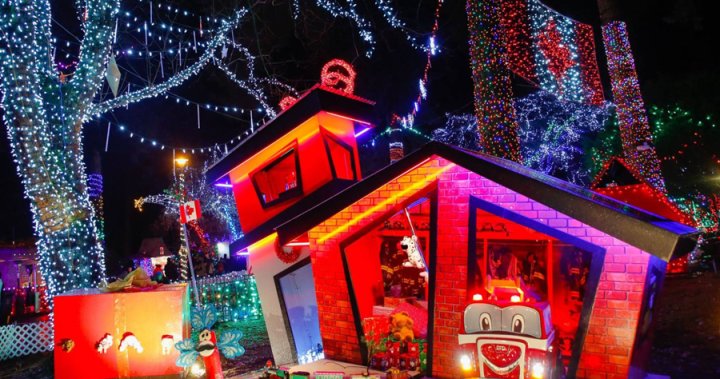The beloved Stanley Park Christmas Train will not be supporting the BC Professional Firefighters’ Burn Fund this holiday season, marking the end of a 26-year partnership that has raised over $2 million for burn survivors and their families.
For many Vancouver families, the annual tradition of riding the decorated miniature train through Stanley Park’s twinkling forest displays has been inextricably linked with supporting burn survivors. This year, however, visitors won’t see the familiar firefighters collecting donations at the popular attraction.
“It was a difficult decision that wasn’t made lightly,” explains Todd Schierling, president of the BC Professional Firefighters’ Burn Fund. “After nearly three decades, we’ve decided to focus our volunteer resources on other fundraising initiatives that align with our current strategic direction.”
The partnership began in 1998 when Vancouver firefighters started collecting donations at the Bright Nights train event. What started as firefighters with donation boots quickly evolved into a significant annual fundraiser, with proceeds helping fund specialized care for burn survivors across British Columbia.
The Vancouver Park Board, which operates the train, confirmed the change but emphasized that the holiday tradition itself will continue. “While we’re saddened to see this partnership end, the Stanley Park Train will still operate this winter with its magical holiday displays,” says Mandy Ryan, spokesperson for the Vancouver Park Board. “We’re incredibly grateful for the firefighters’ dedication over the years.”
For burn survivors like Jennifer Morris, who benefited from the fund’s programs after suffering severe burns in a 2012 house fire, the news comes with mixed emotions. “The Burn Fund provided me with specialized garments, counselling, and a community when I needed it most,” Morris tells me. “Knowing those firefighters stood out in the cold every winter to help people like me—it meant everything.”
According to the organization’s latest annual report, the Burn Fund supports approximately 700 burn survivors each year through various programs including a children’s burn camp, adult survivor retreats, and specialized rehabilitation services. The Stanley Park Train fundraiser typically contributed between $75,000 and $100,000 annually to these efforts.
The change reflects broader shifts in charitable fundraising. Many organizations are reassessing volunteer-intensive events in favor of digital campaigns and corporate partnerships that may yield higher returns with fewer personnel hours.
“Our volunteers have amazing hearts, but they’re stretched thin,” Schierling acknowledges. “We’re looking at more sustainable ways to support burn survivors while respecting the limited time our firefighters have between their demanding jobs and family commitments.”
The Burn Fund isn’t abandoning its holiday fundraising entirely. The organization plans to expand its “Burn Fund Christmas Tree Lot” in North Vancouver and is developing a new winter campaign that will launch in early December.
For Stanley Park Train operators, this marks a transition year. “We’re exploring new charitable partnerships for future seasons,” Ryan notes. “The spirit of giving has always been central to the Bright Nights experience, and we intend to maintain that tradition.”
Community reaction has been primarily supportive, though tinged with nostalgia. The comments section of the Park Board’s announcement filled quickly with memories from families who made annual donations part of their holiday tradition.
“Every year since my son was three, we’d give him extra money to put in the firefighters’ boots,” writes Vancouver resident Melissa Chan on social media. “It was his favorite part—sometimes more than the train itself. We’ll miss seeing those firefighters this year, but we understand things change.”
The Park Board confirmed that tickets for this year’s Stanley Park Train will go on sale in November, with the attraction running from late November through early January, weather permitting. Last year’s operations were disrupted by mechanical issues with the aging trains, leading to several cancellations during peak periods.
For those wishing to continue supporting burn survivors, Schierling suggests visiting the Burn Fund’s website where donations can be made directly. “The need hasn’t diminished,” he emphasizes. “We still have survivors requiring specialized care, children attending our camp programs, and prevention initiatives that save lives.”
As Vancouver families prepare for the upcoming holiday season, the Stanley Park Train will continue its magical journey through the illuminated forest—just with one notable absence from the platform. After 26 years of partnership, both organizations express pride in what they’ve accomplished together and optimism about their separate paths forward.
“Sometimes the most difficult decisions are the right ones,” Schierling reflects. “We’re eternally grateful to every Vancouverite who dropped a donation in our boots over the years. You’ve changed lives, and that impact continues even as this particular tradition ends.”






